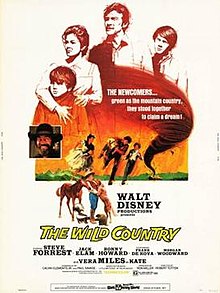
The Johnson County War, also known as the War on Powder River and the Wyoming Range War, was a range conflict that took place in Johnson County, Wyoming from 1889 to 1893. The conflict began when cattle companies started ruthlessly persecuting alleged rustlers in the area, many of whom were settlers who competed with them for livestock, land and water rights. As violence swelled between the large established ranchers and the smaller settlers in the state, it culminated in the Powder River Country, when the ranchers hired gunmen, who invaded the county. The gunmen's initial incursion in the territory alerted the small farmers and ranchers, as well as the state lawmen, and they formed a posse of 200 men that led to a grueling standoff which ended when the United States Cavalry on the orders of President Benjamin Harrison relieved the two forces, although further fighting persisted.
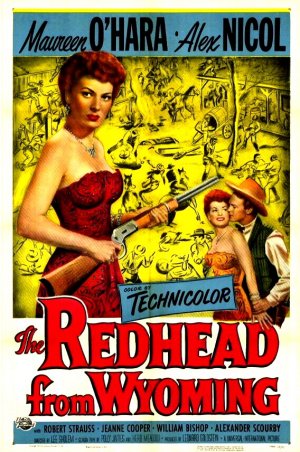
The Redhead from Wyoming is a 1953 American Western film produced by Leonard Goldstein and directed by Lee Sholem. It stars Maureen O'Hara as a saloon proprietress who becomes embroiled in a range war and Alex Nicol as the sheriff who tries to prevent it. The supporting cast includes William Bishop as a politician who provokes the war and Alexander Scourby as a prominent cattle rancher.

White Wilderness is a 1958 nature documentary film produced by Walt Disney Productions as part of its True-Life Adventure series. It is noted for its propagation of the myth of lemming mass suicide.
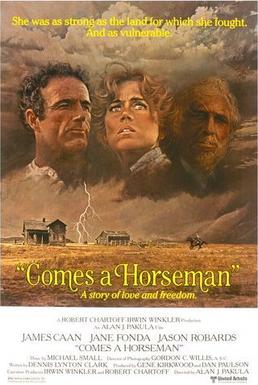
Comes a Horseman is a 1978 American Western drama film starring Jane Fonda, James Caan, Jason Robards, and Richard Farnsworth, directed by Alan J. Pakula.

Cowboy culture is the set of behaviors, preferences, and appearances associated with the attitudes, ethics, and history of the American cowboy. The term can describe the content or stylistic appearance of an artistic representation, often built on romanticized impressions of the wild west, or certain aspects of people's lifestyle, such as their choices in recreation, apparel, and western or southwestern cuisine.

Little Britches: Father and I Were Ranchers is an autobiographical account of Ralph Moody's early life in the vicinity of Littleton, Colorado, from 1906 to 1910. Moody was eight when his father moved to Colorado, and eleven when his father died. This is the first book in Moody's series of autobiographies. It has been in print continuously since 1950.

Golden Oak Ranch is an 890-acre (360-hectare) movie ranch owned by the Walt Disney Studios subsidiary of The Walt Disney Company that serves as a filming location and backlot. The ranch is off of Placerita Canyon Road outside of Newhall, Santa Clarita, California, less than an hour north of Los Angeles; its entrance is not far from Placerita Canyon Road's intersection with California State Route 14.
Tulsa is a 1949 American Western action film directed by Stuart Heisler and starring Susan Hayward and Robert Preston, and featured Lloyd Gough, Chill Wills, and Ed Begley in one of his earliest film roles, billed as Edward Begley.

John Hartford Hoxie was an American rodeo performer and motion-picture actor whose career was most prominent in the silent film era of the 1910s through the 1930s. Hoxie is best recalled for his roles in Westerns and rarely strayed from the genre.

The Rounders is a 1965 American Western comedy film directed by Burt Kennedy and starring Glenn Ford and Henry Fonda. It is based on the 1960 novel of the same name by Max Evans.

Ellen Liddy "Ella" Watson was a pioneer of Wyoming who became known as Cattle Kate, an outlaw of the Old West, although the characterization is a dubious one, as subsequent research has tended to see her as a much maligned victim of a self-styled land baron. Watson had acquired homestead rights on land with water resources vital to the wealthiest rancher in the county, Albert Bothwell, when she was accused by him of cattle rustling. She was abducted from her home and lynched along with her husband by Bothwell and some other ranchers he had incited against her. The bodies were left hanging for two days, and the reputation that attached to her until recently was quickly established by newspaper publicity. Accounts of Watson as a rustler are now regarded as highly biased. Her life has become an Old West legend and inspired a number of television and film accounts.
Ralph Owen Moody was an American writer who wrote 17 novels and autobiographies largely about the American West, though a few are set in New England. He was born in East Rochester, New Hampshire and moved to Littleton, Colorado in 1906 with his family when he was eight in the hopes that a dry climate would improve his father Charles's tuberculosis. Moody detailed his experiences in Colorado in the first book of the Little Britches series, Little Britches: Father and I Were Ranchers.
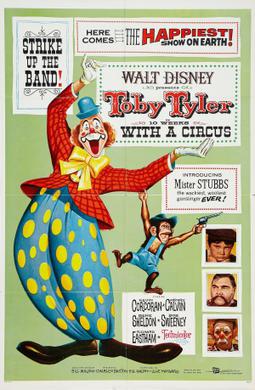
Toby Tyler or 10 Weeks with a Circus, also known simply as Toby Tyler, is a 1960 American drama film directed by Charles Barton and starring Kevin Corcoran, Henry Calvin, Gene Sheldon, and Richard Eastham. It was produced by Walt Disney Productions and distributed by Buena Vista Distribution Company on January 21, 1960. It is based on the 1880 children's book Toby Tyler; or, Ten Weeks with a Circus by James Otis Kaler.

Roy Barcroft was an American character actor famous for playing villains in B-Westerns and other genres. From 1937 to 1957, he appeared in more than 300 films for Republic Pictures. Film critic Leonard Maltin acclaimed Barcroft as "Republic Pictures' number one bad guy".

Westward Ho the Wagons! is a 1956 American Western film starring Fess Parker and Kathleen Crowley and produced by Walt Disney Productions. Based on Mary Jane Carr's novel Children of the Covered Wagon, the film was produced by Bill Walsh, directed by William Beaudine, and released to theatres on December 20, 1956 by Buena Vista Distribution Company. The supporting cast features Mouseketeer Cubby O'Brien, Jeff York, Sebastian Cabot, David Stollery, and George Reeves.

The Adventures of Bullwhip Griffin is a 1967 American Western comedy film directed by James Neilson, produced by Walt Disney Productions, starring Roddy McDowall, Suzanne Pleshette, Hermione Baddeley, and Karl Malden. The film's screenplay, by Lowell S. Hawley, was based on the novel By the Great Horn Spoon! by Sid Fleischman. The songs were written by Richard M. Sherman and Robert B. Sherman and the theme song was written by Mel Leven and George Bruns, the latter of whom also composed the film's score. It was the fifth and final film Neilson directed for Disney.
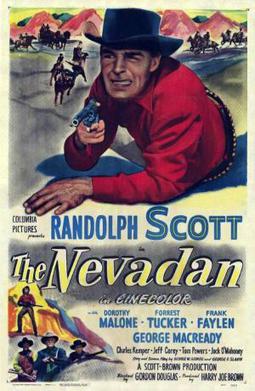
The Nevadan is a 1950 American Cinecolor Western film directed by Gordon Douglas and starring Randolph Scott, Dorothy Malone, Forrest Tucker, Frank Faylen, and George Macready. Written by George W. George and George F. Slavin, the film is about a mysterious stranger who crosses paths with an outlaw bank robber and a greedy rancher. The Nevadan was filmed in Lone Pine, California.
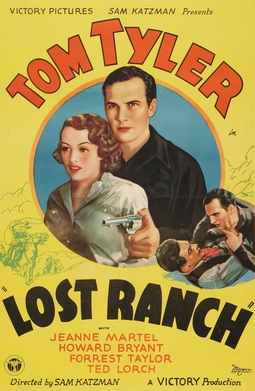
Lost Ranch is a 1937 American Western film produced and directed by Sam Katzman starring Tom Tyler.
Little Britches was an outlaw in the American Old West associated with Cattle Annie. Their exploits are fictionalized in the 1981 film Cattle Annie and Little Britches, directed by Lamont Johnson and starring Diane Lane as Little Britches.

Orphan of the Pecos is a 1937 American Western film produced and directed by Sam Katzman and starring Tom Tyler, Jeanne Martel, Howard Bryant, and Forrest Taylor. Written by Basil Dickey, the film is about a cowboy who is falsely accused of murdering a rancher whose body he discovers. Before the sheriff arrives, he escapes and tries to find evidence to clear his name and help the rancher's daughter save her ranch. The film was released in the United States on December 30, 1937 by Victory Pictures.
